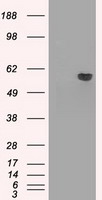AKT2 Mouse Monoclonal Antibody [Clone ID: OTI4G1]
CAT#: TA500831
AKT2 mouse monoclonal antibody, clone OTI4G1 (formerly 4G1)
Size: 30 ul
Formulation: Carrier Free
Specifications
| Product Data | |
| Clone Name | OTI4G1 |
| Applications | IP, WB |
| Recommended Dilution | WB 1:2000, IP 2ug/500ul |
| Reactivities | Human, Mouse, Rat |
| Host | Mouse |
| Isotype | IgG1 |
| Clonality | Monoclonal |
| Immunogen | Full length human recombinant protein of human AKT2 (NP_001617) produced in HEK293T cell. |
| Formulation | PBS (pH 7.3) containing 1% BSA, 50% glycerol and 0.02% sodium azide. |
| Concentration | 1 mg/ml |
| Purification | Purified from mouse ascites fluids or tissue culture supernatant by affinity chromatography (protein A/G) |
| Conjugation | Unconjugated |
| Storage | Store at -20°C as received. |
| Stability | Stable for 12 months from date of receipt. |
| Predicted Protein Size | 55.6 kDa |
| Gene Name | AKT serine/threonine kinase 2 |
| Database Link | |
| Background | This gene is a putative oncogene encoding a protein belonging to a subfamily of serine/threonine kinases containing SH2-like (Src homology 2-like) domains. The gene was shown to be amplified and overexpressed in 2 of 8 ovarian carcinoma cell lines and 2 of 15 primary ovarian tumors. Overexpression contributes to the malignant phenotype of a subset of human ductal pancreatic cancers. The encoded protein is a general protein kinase capable of phophorylating several known proteins. [provided by RefSeq] |
| Synonyms | HIHGHH; PKBB; PKBBETA; PRKBB; RAC-BETA |
| Reference Data | |
| Protein Families | Druggable Genome, ES Cell Differentiation/IPS, Protein Kinase |
| Protein Pathways | Acute myeloid leukemia, Adipocytokine signaling pathway, Apoptosis, B cell receptor signaling pathway, Chemokine signaling pathway, Chronic myeloid leukemia, Colorectal cancer, Endometrial cancer, ErbB signaling pathway, Fc epsilon RI signaling pathway, Fc gamma R-mediated phagocytosis, Focal adhesion, Glioma, Insulin signaling pathway, Jak-STAT signaling pathway, MAPK signaling pathway, Melanoma, mTOR signaling pathway, Neurotrophin signaling pathway, Non-small cell lung cancer, Pancreatic cancer, Pathways in cancer, Progesterone-mediated oocyte maturation, Prostate cancer, Renal cell carcinoma, Small cell lung cancer, T cell receptor signaling pathway, Tight junction, Toll-like receptor signaling pathway, VEGF signaling pathway |
Documents
| Product Manuals |
| FAQs |
| SDS |
Resources
| Antibody Resources |
{0} Product Review(s)
Be the first one to submit a review






























































































































































































































































 Germany
Germany
 Japan
Japan
 United Kingdom
United Kingdom
 China
China





